BusinessEurope Headlines No. 2020-38
EU’s recovery: we must protect jobs and minimise long-term economic damage
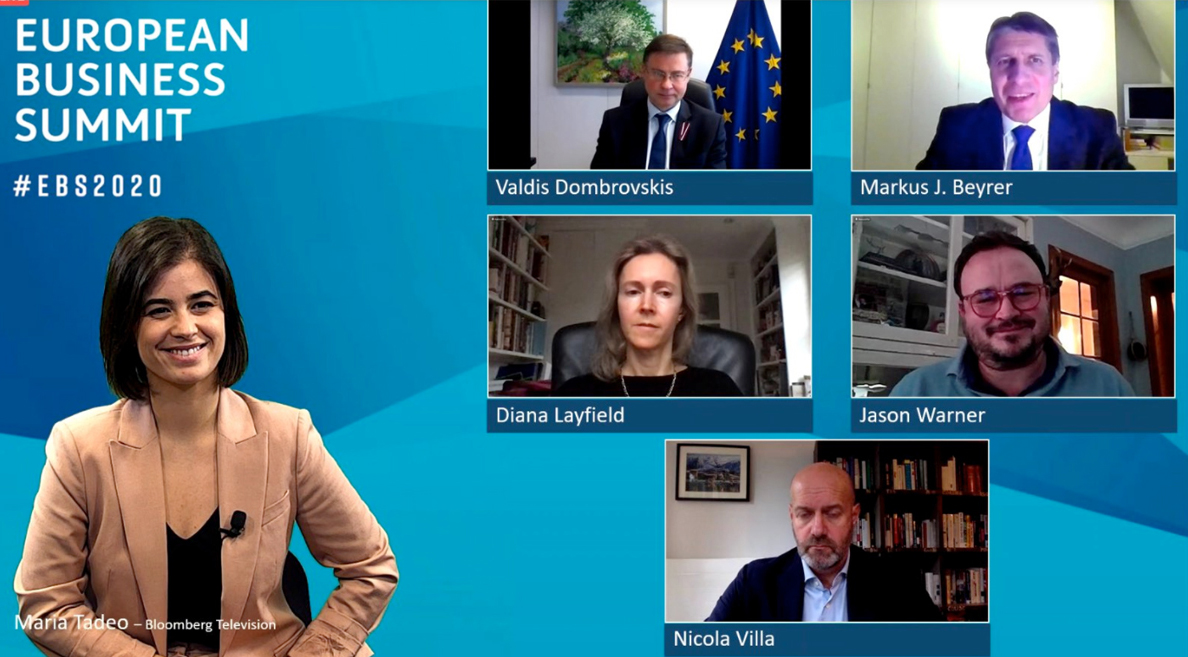
We must do everything possible to find a bridge to ensure viable businesses and jobs are protected through this crisis, and minimise long-term scarring to the economy. This was the main message of BusinessEurope Director General Markus J. Beyrer at a panel on the EU’s economic recovery during the European Business Summit on 16 November. Among the ingredients to the recovery, he cited for instance avoiding any premature unwinding of measures to support business and workers; and ensuring that our regulatory approach reflects the economic situation. Beyrer also highlighted that while fully supporting climate neutrality and agreeing that the Green Deal is one of the pillars of the European recovery plan, we must underpin the Green Deal with a credible industrial strategy. A real business plan is needed in order to mobilise the necessary investments for a recovery that is sustainable also economically.
Contact: Jasmin Ploner
Video message: WTO turns 25
Markus J. Beyrer, BusinessEurope’s Director General shares his thoughts about the World Trade Organisation (WTO) on its 25th anniversary.
Our comment
New 2030 climate ambition – an impact assessment that will stand the test of time?
By Antonia Bierbaumer, Adviser for Industrial Policy
 The EU aims to be climate-neutral by 2050. In her 2020 State of the Union speech in September, European Commission President von der Leyen announced the EU’s plan to reduce greenhouse gas emissions by at least 55% by 2030. A substantial increase compared to the existing target of at least 40%.
The EU aims to be climate-neutral by 2050. In her 2020 State of the Union speech in September, European Commission President von der Leyen announced the EU’s plan to reduce greenhouse gas emissions by at least 55% by 2030. A substantial increase compared to the existing target of at least 40%.
The European business community strongly supports the realisation of the Green Deal. At the same time, we are convinced that the decision to step up ambition must be based on a solid and realistic evaluation of the economic situation that stands the test of time. In this regard, we have just published comments on the European Commission’s Impact Assessment, highlighting some missing factors and possible issues that would require further considerations by EU policymakers.
Let me highlight a few here:
The decision to step up ambition comes in the toughest time for the European economy, with a still ongoing and unprecedented health and economic crisis. The second wave of Covid-19 has again drastic effects on the economy. The impact assessment, however, considers the overall Covid-19 impact in a narrow sensitivity analysis only and expects a rapid rebound of economic activity. A scenario that seems less and less likely.
Furthermore, the impact assessment brings questions around the Green Deal being the overall growth strategy for Europe. According to the best-case scenario, the European economy would only expand by +0.55% point growth (on top of an estimated 21.3–24.2% real GDP growth). Neither the findings for exports nor employment support the growth strategy narrative. This leads to the question: how can the transition be designed in a more economically stimulating manner?
Noteworthy are also the relatively low estimated additional investment costs for industry. Only about 20 billion euros (total additional investment costs: 350 billion euros/year) are expected to be incurred by industry. This figure, however, is not communicating the entire costs of the transition, as it does not include operational expenditure (OPEX) and energy system costs as well, as it underestimates the emissions trading system costs for industry (compliance and indirect costs).
The development of climate-friendly technology is essential for reaching the long-term goal of carbon neutrality in 2050. Therefore, investment in innovation is of the essence now, since many technologies needed for the transition are either in a prototype or demonstration stage or not yet deployed on mass-market scale. The microeconomic impact of the currently reduced investment capacity of companies is not considered in the assessment.
With these comments we want to contribute to develop a well-informed debate on setting the new EU 2030 climate ambition.
![]() Contact: Antonia Bierbaumer
Contact: Antonia Bierbaumer
State of play of transatlantic economic relations
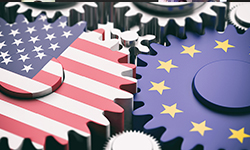 “The impact of Covid-19 on European industry and supply chains has been and still is dramatic. We hope that we can work with the new US administration on a positive transatlantic agenda to relaunch growth on both sides of the Atlantic“, said Markus J. Beyrer, Director General of BusinessEurope, at the Transatlantic Business & Investment Conference on 17 November. He highlighted that the intensity of the economic downturn varies considerably across the EU Member States and that even though economies are gradually recovering from the severe output falls seen in the spring, output remains well below pre-crisis levels. “We must turn our attention to untapping the potential of the bilateral relationship, and resolving disputes that are putting unnecessary strain on companies of both sides at a time when they are already suffering from a global crisis”, Beyrer concluded.
“The impact of Covid-19 on European industry and supply chains has been and still is dramatic. We hope that we can work with the new US administration on a positive transatlantic agenda to relaunch growth on both sides of the Atlantic“, said Markus J. Beyrer, Director General of BusinessEurope, at the Transatlantic Business & Investment Conference on 17 November. He highlighted that the intensity of the economic downturn varies considerably across the EU Member States and that even though economies are gradually recovering from the severe output falls seen in the spring, output remains well below pre-crisis levels. “We must turn our attention to untapping the potential of the bilateral relationship, and resolving disputes that are putting unnecessary strain on companies of both sides at a time when they are already suffering from a global crisis”, Beyrer concluded.
Contact: Eleonora Catella
EU social partners discuss recovery with European Commission
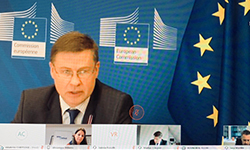 Whilst European companies are grappling with the consequences of a second wave of Covid-19 lockdown measures, policy-makers must avoid unwinding support to business and workers prematurely, such as short-time work schemes and tax holidays, which would risk a new recession and greater long-term economic scarring. Now that the recovery and resilience facility is being introduced, a key priority is to improve the labour markets reform coordination process at EU level. Going forward, the European Commission must ensure an appropriate involvement of social partners by Member States when preparing their national recovery plans in all Member States. BusinessEurope also calls for a quadri-partite concertation process involving national governments and social partners at an early state towards the action plan on the European pillar of social rights. These were the key messages of BusinessEurope Director General Markus J. Beyrer during a meeting between European Commission Vice-President Valdis Dombrovskis and Commissioner for Employment and Social Rights Nicolas Schmit and the EU social partners, held on 16 November.
Whilst European companies are grappling with the consequences of a second wave of Covid-19 lockdown measures, policy-makers must avoid unwinding support to business and workers prematurely, such as short-time work schemes and tax holidays, which would risk a new recession and greater long-term economic scarring. Now that the recovery and resilience facility is being introduced, a key priority is to improve the labour markets reform coordination process at EU level. Going forward, the European Commission must ensure an appropriate involvement of social partners by Member States when preparing their national recovery plans in all Member States. BusinessEurope also calls for a quadri-partite concertation process involving national governments and social partners at an early state towards the action plan on the European pillar of social rights. These were the key messages of BusinessEurope Director General Markus J. Beyrer during a meeting between European Commission Vice-President Valdis Dombrovskis and Commissioner for Employment and Social Rights Nicolas Schmit and the EU social partners, held on 16 November.
Contact: Maxime Cerutti
First steps in the run-up to an updated industrial strategy
 Today, EU internal market and industry ministers met in videoconference to discuss how recovery from the Covid-19 crisis can be used as leverage for a more dynamic, resilient and competitive European industry. This Council meeting represented an opportunity to discuss the first steps in the run-up to the update of the European Commission industrial strategy scheduled for the second quarter of 2021. Ahead of this meeting, BusinessEurope Director General Markus J. Beyrer addressed a letter to the German Federal Minister for Economic Affairs and Energy, Peter Altmaier, chair of the meeting under the German EU Presidency. Beyrer highlighted some key principles on which an updated industrial strategy should be based on: “an updated industrial strategy should fully acknowledge the impact of Covid-19 on the economy, including the possibility of a delayed recovery, and develop around the need to build investment capacity. But it should also underpin the Green Deal with a credible business plan, support digital transformation, restore Single Market freedoms of movement to pre-Covid conditions urgently, and support an ambitious trade agenda as well as all-sized European companies, and SMEs in particular”.
Today, EU internal market and industry ministers met in videoconference to discuss how recovery from the Covid-19 crisis can be used as leverage for a more dynamic, resilient and competitive European industry. This Council meeting represented an opportunity to discuss the first steps in the run-up to the update of the European Commission industrial strategy scheduled for the second quarter of 2021. Ahead of this meeting, BusinessEurope Director General Markus J. Beyrer addressed a letter to the German Federal Minister for Economic Affairs and Energy, Peter Altmaier, chair of the meeting under the German EU Presidency. Beyrer highlighted some key principles on which an updated industrial strategy should be based on: “an updated industrial strategy should fully acknowledge the impact of Covid-19 on the economy, including the possibility of a delayed recovery, and develop around the need to build investment capacity. But it should also underpin the Green Deal with a credible business plan, support digital transformation, restore Single Market freedoms of movement to pre-Covid conditions urgently, and support an ambitious trade agenda as well as all-sized European companies, and SMEs in particular”.
![]() Contact: Daniele Olivieri
Contact: Daniele Olivieri
EU beating cancer plan should build on good worker protection
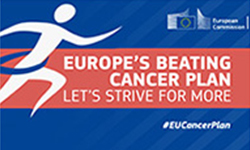 "The EU takes effective action to support Member States to tackle cancer, in particular in protecting workers. The beating cancer plan should recognise the value of the EU health and safety legislation in this field, alongside other regulation like REACH. It should make sure that we prioritise action on cancer-causing substances that affect the most workers, based on scientific evidence". This was the key message of BusinessEurope Deputy Director General, Thérèse de Liedekerke, at a meeting between social partners and the European Commissioner for Health and Food Safety Stella Kyriakidis. BusinessEurope also highlighted the important issue of return to work for cancer patients and survivors. The right balance must be found, taking into account the needs and capacity of the individual, the employers' need to maintain productivity, and the needs of co-workers. This has to be combined with support from public health bodies and social services to accompany people in getting back to work.
"The EU takes effective action to support Member States to tackle cancer, in particular in protecting workers. The beating cancer plan should recognise the value of the EU health and safety legislation in this field, alongside other regulation like REACH. It should make sure that we prioritise action on cancer-causing substances that affect the most workers, based on scientific evidence". This was the key message of BusinessEurope Deputy Director General, Thérèse de Liedekerke, at a meeting between social partners and the European Commissioner for Health and Food Safety Stella Kyriakidis. BusinessEurope also highlighted the important issue of return to work for cancer patients and survivors. The right balance must be found, taking into account the needs and capacity of the individual, the employers' need to maintain productivity, and the needs of co-workers. This has to be combined with support from public health bodies and social services to accompany people in getting back to work.
Contact: Rebekah Smith
Image copyright: European Commission
Single Market: discussion with EU Parliament IMCO coordinators
 With the European Commission intensifying its work in delivering legislative initiatives, the Single Market-related measures gain more and more attention. On 16 November, BusinessEurope’s Internal Market Policy Committee (IMCO) discussed the Single Market priorities for the coming year. The coordinators for the European Parliament’s Internal Market and Consumer Protection Policy Committee from the biggest political groups, Andreas Schwab (EPP), Christel Schaldemose (S&D) and Dita Charanzová (Renew Europe), were invited to share their views on the work ahead.
With the European Commission intensifying its work in delivering legislative initiatives, the Single Market-related measures gain more and more attention. On 16 November, BusinessEurope’s Internal Market Policy Committee (IMCO) discussed the Single Market priorities for the coming year. The coordinators for the European Parliament’s Internal Market and Consumer Protection Policy Committee from the biggest political groups, Andreas Schwab (EPP), Christel Schaldemose (S&D) and Dita Charanzová (Renew Europe), were invited to share their views on the work ahead.
The discussion was based on recent European Parliament’s IMCO reports and opinions, the Commission President’s State of the Union address and her Letter of Intent, the Commission’s work program 2021 as well as the Council’s political guidance. The participants highlighted the Single Market as enabler for Europe’s exit from the pandemic crisis and its success in green and digital transitions. With many initiatives on the way to co-legislators, the underlying Single Market freedoms should be ensured as well as better regulation principles followed, many discussants stressed.
Contact: Martynas Barysas
Image copyright: European Commission
This isn’t just a big-tech issue
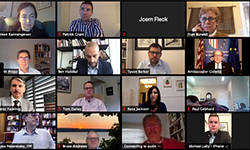 A lot is going on in the world of data flows. The controversial Schrems II judgement was delivered over the summer, recent EU guidance on how transfers can be made have now been delivered and we await important national court judgements that could direct similar enforcement actions across Europe in the months to come. The future of global data flows is at stake. BusinessEurope’s Adviser for the Digital Economy Patrick Grant recently took part in an Atlantic Council panel discussion on a “Durable Solution to Transatlantic Data Transfers” on Wednesday 18 November alongside Tyson Barker, German Council on Foreign Relations, Alexander Joel, American University Washington College of Law and Kenneth Propp, Atlantic Council and Georgetown University Law Center. Grant stated that “this isn’t just a big-tech or even transatlantic issue, Europe has a lot to lose here and we are not just speaking about business opportunities elsewhere, we are talking about loss of expertise and collaboration in many sectors to continue offering top quality goods and services within Europe, not to mention the detrimental impact this could have on research or cybersecurity as we wade through the ongoing COVID-19 pandemic”. The European Data Protection Board (EDPB) Guidance seems to throw standard contractual clauses, a favoured transatlantic data transfer method following the annulation of the EU-US Privacy Shield, into near total impractical use. As a result, European businesses relying upon them to make transatlantic and even global transfers face the stark possibility of localising all data, no matter its type or use, within the EU. This goes against our interests, values and culture. BusinessEurope continues to assess the EDPB Guidelines, we will respond accordingly to the highly challenging 14 day consultation period.
A lot is going on in the world of data flows. The controversial Schrems II judgement was delivered over the summer, recent EU guidance on how transfers can be made have now been delivered and we await important national court judgements that could direct similar enforcement actions across Europe in the months to come. The future of global data flows is at stake. BusinessEurope’s Adviser for the Digital Economy Patrick Grant recently took part in an Atlantic Council panel discussion on a “Durable Solution to Transatlantic Data Transfers” on Wednesday 18 November alongside Tyson Barker, German Council on Foreign Relations, Alexander Joel, American University Washington College of Law and Kenneth Propp, Atlantic Council and Georgetown University Law Center. Grant stated that “this isn’t just a big-tech or even transatlantic issue, Europe has a lot to lose here and we are not just speaking about business opportunities elsewhere, we are talking about loss of expertise and collaboration in many sectors to continue offering top quality goods and services within Europe, not to mention the detrimental impact this could have on research or cybersecurity as we wade through the ongoing COVID-19 pandemic”. The European Data Protection Board (EDPB) Guidance seems to throw standard contractual clauses, a favoured transatlantic data transfer method following the annulation of the EU-US Privacy Shield, into near total impractical use. As a result, European businesses relying upon them to make transatlantic and even global transfers face the stark possibility of localising all data, no matter its type or use, within the EU. This goes against our interests, values and culture. BusinessEurope continues to assess the EDPB Guidelines, we will respond accordingly to the highly challenging 14 day consultation period.
Contact: Patrick Grant
The EU’s future trade policy should remain open and ambitious
 In the framework of the European Commission’s public consultation on the EU’s Trade Policy Review, BusinessEurope delivers a clear message for maintaining an open, rules-based and ambitious approach to trade and investment, enhancing at the same time the level playing field in this area. These should be key components in developing the EU’s model of “open strategic autonomy” and in ensuring that trade effectively contributes to the green and digital transformations. It is important that the EU continues to lead against protectionism at all levels: multilaterally; through the reform of the World Trade Organisation, bilaterally; through ambitious trade agreements that enhance access to markets for European companies, and unilaterally; by taking the necessary measures to ensure that products and services entering the EU market are not distortive and meet EU standards.
In the framework of the European Commission’s public consultation on the EU’s Trade Policy Review, BusinessEurope delivers a clear message for maintaining an open, rules-based and ambitious approach to trade and investment, enhancing at the same time the level playing field in this area. These should be key components in developing the EU’s model of “open strategic autonomy” and in ensuring that trade effectively contributes to the green and digital transformations. It is important that the EU continues to lead against protectionism at all levels: multilaterally; through the reform of the World Trade Organisation, bilaterally; through ambitious trade agreements that enhance access to markets for European companies, and unilaterally; by taking the necessary measures to ensure that products and services entering the EU market are not distortive and meet EU standards.
![]() Contact: Luisa Santos, Sofia Bournou
Contact: Luisa Santos, Sofia Bournou
Short time work schemes: companies need flexibility to adapt to crisis
 Short time work schemes (STWS) have been widely used to mitigate negative employment impacts of the Covid-19 pandemics. Their effectiveness to avoid massive increases of unemployment across Member States by helping companies retain employment where possible has been remarkable during the first wave of Covid-19 crisis. Well-regulated short-time work schemes continuously have a role to play now entering a second wave. Going forward, all Member States need to allow companies’ adaptation to changing economic realities. A stronger focus on active labour market policies and skills development is also needed to ensure good use of the concerned workers and growing number of unemployed people’s free time to improve their employability. Other important success factors are the early and continuous involvement of national social partners to tailor the schemes to economic and social needs across sectors and ensure the necessary flexibility and complementarity with social dialogue solutions. These were the key messages passed by Maxime Cerutti, Social Affairs Director at BusinessEurope, during a meeting on short-time work between national governments and social partners that was organised in the context of the Council’s Employment Committee policy analysis group on 13 November.
Short time work schemes (STWS) have been widely used to mitigate negative employment impacts of the Covid-19 pandemics. Their effectiveness to avoid massive increases of unemployment across Member States by helping companies retain employment where possible has been remarkable during the first wave of Covid-19 crisis. Well-regulated short-time work schemes continuously have a role to play now entering a second wave. Going forward, all Member States need to allow companies’ adaptation to changing economic realities. A stronger focus on active labour market policies and skills development is also needed to ensure good use of the concerned workers and growing number of unemployed people’s free time to improve their employability. Other important success factors are the early and continuous involvement of national social partners to tailor the schemes to economic and social needs across sectors and ensure the necessary flexibility and complementarity with social dialogue solutions. These were the key messages passed by Maxime Cerutti, Social Affairs Director at BusinessEurope, during a meeting on short-time work between national governments and social partners that was organised in the context of the Council’s Employment Committee policy analysis group on 13 November.
Contact: Anna Kwiatkiewicz-Mory
Three biggest patent offices discuss Covid-19 and future cooperation
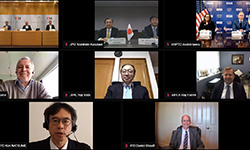 On 13 November, BusinessEurope co-hosted together with the European Patent Office (EPO) the 38th meeting of the Heads of the Trilateral Offices with the representatives of the European, American and Japanese patent users. The Trilateral Cooperation was set up in 1983 between the European, American and Japanese patent offices, which together process the majority of all patent applications filed worldwide, including applications under the Patent Cooperation Treaty. At the meeting, industry representatives and Heads of the three biggest patent offices (EPO, USPTO and JPO) discussed on the consequences of the Covid-19 pandemic on the global economy and on the patent system and on the future of trilateral cooperation. Thierry Sueur, Chair of BusinessEurope Patents Working Group and co-chair of this meeting, stressed the importance of the trilateral cooperation as a privileged forum to share experiences, best practices and suggestions in view of the continued improvement of the patent systems globally.
On 13 November, BusinessEurope co-hosted together with the European Patent Office (EPO) the 38th meeting of the Heads of the Trilateral Offices with the representatives of the European, American and Japanese patent users. The Trilateral Cooperation was set up in 1983 between the European, American and Japanese patent offices, which together process the majority of all patent applications filed worldwide, including applications under the Patent Cooperation Treaty. At the meeting, industry representatives and Heads of the three biggest patent offices (EPO, USPTO and JPO) discussed on the consequences of the Covid-19 pandemic on the global economy and on the patent system and on the future of trilateral cooperation. Thierry Sueur, Chair of BusinessEurope Patents Working Group and co-chair of this meeting, stressed the importance of the trilateral cooperation as a privileged forum to share experiences, best practices and suggestions in view of the continued improvement of the patent systems globally.
Contact: Elena Bertolotto
BusinessEurope comments on the Sustainable Product Policy Initiative
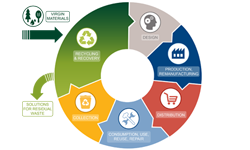 “European business welcomes the new Circular Economy Action Plan (CEAP), and with it the Sustainable Product Policy Initiative (SPPI), one of the action plan’s most important legislative initiatives to shift towards a functioning market in Europe for secondary raw materials and circular products”, reads the document submitted to the SPPI inception impact assessment consultation on 13 November. BusinessEurope highlights that in order to make it a success, the CEAP’s should focus on product-groups and value-chains, as measures will need to be tailored to the different materials in the scope.
“European business welcomes the new Circular Economy Action Plan (CEAP), and with it the Sustainable Product Policy Initiative (SPPI), one of the action plan’s most important legislative initiatives to shift towards a functioning market in Europe for secondary raw materials and circular products”, reads the document submitted to the SPPI inception impact assessment consultation on 13 November. BusinessEurope highlights that in order to make it a success, the CEAP’s should focus on product-groups and value-chains, as measures will need to be tailored to the different materials in the scope.
Other elements brought up by the SPPI included: establishing circularity criteria, broadening the scope of the Ecodesign Directive, and improving reliable information on sustainability across the value chain. BusinessEurope stresses that “it will be important to clarify the exact definitions, options and thresholds the European Commission is considering to define the circularity criteria, and how this would all feed into the broader discussion on applying a life cycle approach to products and on making them more sustainable overall.” To do so, business involvement in the process will be crucial, given that they will need to ensure the safety and performance of the products targeted.
![]() Contact: Cecilia Serrano-Piedecasas
Contact: Cecilia Serrano-Piedecasas
Calendar 
- 24 November: What trade can do for climate - Apero webinar 3/3: Unilateral actions
- 26 November: BusinessEurope Council of Presidents
- 26-27 November: Workshop on the future of vocational education and training (VET)
- 3 December: Webinar on the implementation of EU free-trade agreements (FTAs)
Not yet a subscriber? Register here.
Reminder: please have a look at our privacy policy